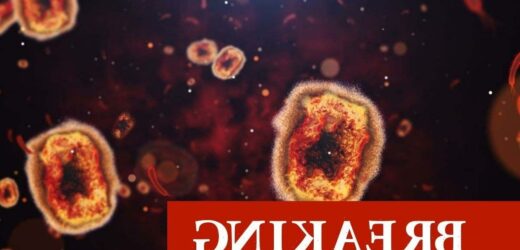
We use your sign-up to provide content in ways you’ve consented to and to improve our understanding of you. This may include adverts from us and 3rd parties based on our understanding. You can unsubscribe at any time. More info
The UKHSA issued the updated guidance today as monkeypox case numbers in England jumped by 71 — bringing the total number of confirmed cases in the the UK to 179.
The UKHSA said: “People with possible, probable or confirmed monkeypox should avoid contact with other people until their lesions have healed and the scabs have dried off.
“Cases can reduce the risk of transmission by following standard cleaning and disinfection methods and washing their own clothing and bed linen with standard detergents in a washing machine.
“Cases should also abstain from sex while symptomatic, including the period of early symptom onset, and while lesions are present. Whilst there is currently no available evidence of monkeypox in genital excretions, as a precaution, cases are advised to use condoms for 8 weeks after infection and this guidance will be updated as evidence emerges.
“If people with possible, probable or confirmed monkeypox infection need to travel to seek healthcare, they should ensure any lesions are covered by cloth and wear a face covering and avoid public transport where possible.
“Contacts of someone with monkeypox will also be risk assessed and told to isolate for 21 days if necessary.”
UKHSA senior medical advisor Dr Ruth Milton said: “This new monkeypox guidance sets out important measures for healthcare professionals and the public for managing the disease including how to safely isolate at home and reduce the risk to others.
“The highest risk of transmission is through direct contact with someone with monkeypox. The risk to the UK population remains low and anyone with unusual rashes or lesions on any part of their body should immediately contact NHS 111 or their local sexual health service.”
More to follow
Source: Read Full Article

